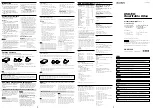
Chapter 4 Parameters
|
4-78
Revision May 2008, ME14, SW V3.04
Pr. 119
Differential Time (D)
Unit: 0.01sec
Settings 0.00 to 1.00 sec
Factory Setting: 0.00
This parameter determines the damping effect for the PID feedback loop. If the differential
time is long, any oscillation will quickly subside. If the differential time is short, the oscillation
will subside slowly.
Pr. 120
Integration’s Upper Bound Frequency
Settings 00 to 100 %
Factory Setting: 100 %
This parameter determines the integration’s upper frequency limit while operating in the PID
feedback loop. (Limit = Pr.03
×
Pr.120). During a fast Integration response, it is possible for the
frequency to surpass a reasonable point. This parameter will help limit this frequency spike.
Pr. 121
One-Time Delay
Unit: 0.1sec
Factory Setting: 0.0
Settings 0.0 to 2.5 sec
0.0
disable
PI Control: When controlled by P action only, deviations cannot be eliminated entirely. To
eliminate residual deviations, the P + I control is generally utilized. If PI is used, it could
eliminate the deviation caused by set-point changes and external interferences. However, if
the I-action is excessively powerful, it will delay the response to the variation. The P-action
could solely be used on a loading system that possesses integral components.
PD Control: when a deviation occurs, the system immediately generates some operational
load that is greater than the single load generated by the D-action in order to restrain the
increment of the deviation. If the deviation is small, the effectiveness of the P-action decreases
as well. In some cases, control systems include integral component loads, which are
controlled by the P action only, and sometimes, if the integral component is functioning, the
whole system will be vibrating. In such cases, a PD control could be used to lower the P-
action’s vibration and to stabilize the system. In other words, this control is good for use if the
loads have no braking functions over the process.
PID Control: Uses the I-action to eliminate the deviation and the D-action to restrain the
vibration, and combine with the P action to construct the PID control. The PID control method
normally determines a control process with no deviations, high accuracy and very stable.
Summary of Contents for VFD-M Series
Page 1: ......
Page 2: ......
Page 3: ......
Page 12: ...Chapter 1 Introduction Revision May 2008 ME14 SW V3 04 1 3 1 1 4 External Parts and Labels ...
Page 17: ...Chapter 1 Introduction 1 8 Revision May 2008 ME14 SW V3 04 This page intentionally left blank ...
Page 21: ...Chapter 2 Installation and Wiring 2 4 Revision May 2008 ME14 SW V3 04 Good Not allowed ...
Page 121: ...Chapter 4 Parameters 4 86 Revision May 2008 ME14 SW V3 04 This page intentionally left blank ...
Page 149: ...Appendix B Accessories B 4 Revision May 2008 ME14 SW V3 04 ...
















































